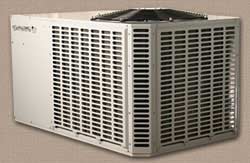Hallowell International a Bangor, Maine-based company has figured out a way to get heat pumps--the basis for heating and cooling systems for much of the Southwest U.S.--to work decently in cool climates. For residents in the Northeast and Midwest, that's good news. Electric heat pumps are more efficient than fossil fuel heating systems and double as air conditioners in the summer.
In some northern states, residents can pay up to $4,000 a year to heat and cool their homes with fossil fuels, said Hallowell CEO Duane Hallowell. The company claims its heat pumps can cut that figure by up to 70 percent. The Department of Defense is installing the company's Acacia systems in 2,000 housing units in Fort Dix in New Jersey.
Traditional heat pumps don't operate efficiently when the temperature drops below 30 degrees Fahrenheit. Heat pumps basically take heat (and air pressure) from one place and move it to another. Liquid refrigerant inside pressurized coils sucks heat from the air inside of a home and then expels it outside; the heat turns the refrigerant into a gas in the process. The refrigerant then gets re-compressed, and the cooling process continues.
To heat a home, the stages get reversed. The refrigerant gets heated outside and discharges the absorbed energy indoors.
"It is a question of how many kilowatt hours do you need to remove X million BTUs or how many therms do you need to create Y number of BTUs," Hallowell said. "That is how guys like me look at the world."
The fact that the outside air has to be warm for a heat pump to create heat, however, has always been the problem. "The industry has been plagued with great air conditioners," he said.
Hallowell's trick is a second air compressor that creates an artificial environment around the heat pump. Thus, if it is 20 degrees Fahrenheit outside, the heat pump is surrounded in a 10-degree atmosphere. The outside air molecules as a result contain more energy than the refrigerant. Heat is motion, and those outside molecules are wiggling more. The energy is absorbed, compressed, and becomes heat.
"You want the heat pump to think it's hot outside," Hallowell said. "We create a 10-degree difference."
Besides a heating and cooling system, Hallowell also sells a water heater.
It is also working on something it calls the cube, a 2x2x2 foot device that will provide the heating, cooling, and hot water for a house or condominium. Prototypes have already been built.
"The cube will blow the doors off of a lot of things," Hallowell asserted.

